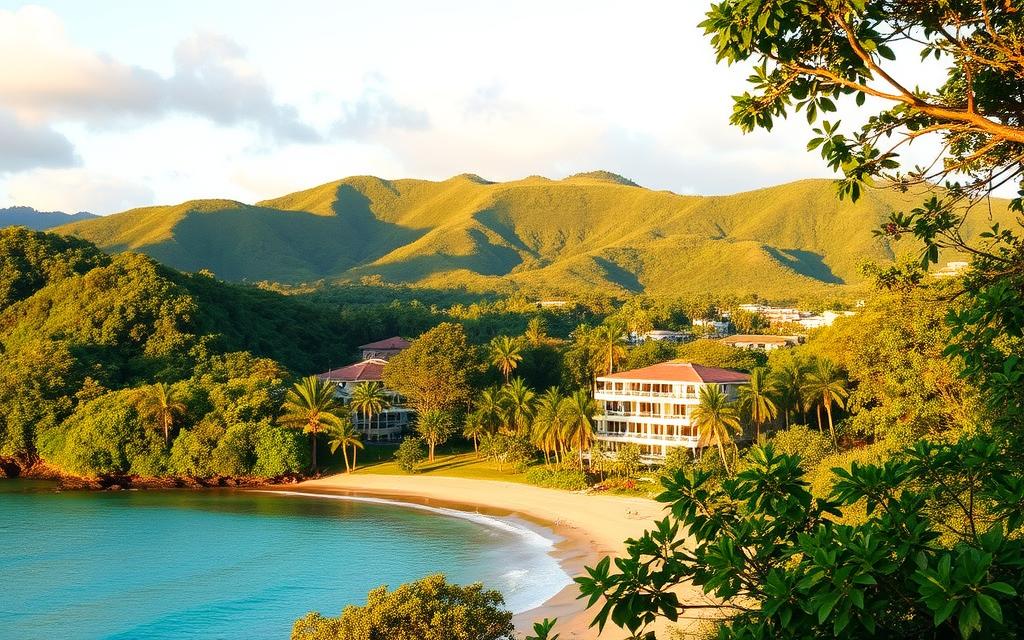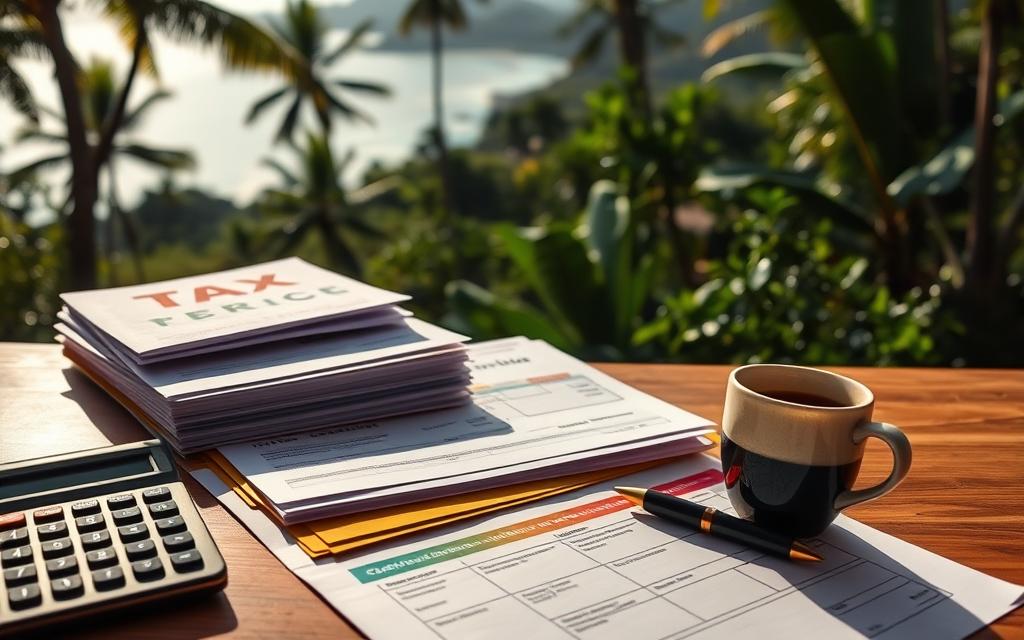Can I own property in Costa Rica without residency?

Costa Rica has emerged as an attractive destination for individuals and families seeking a better quality of life. Known for its natural beauty, mild climate, and rich culture, this Central American country is a desirable location for those looking to settle permanently or temporarily.
The country welcomes foreign investment, allowing non-residents to purchase property without needing residency or citizenship. This makes Costa Rica an attractive option for investors, retirees, and those seeking a vacation home in a stunning natural setting.
We'll explore the legal framework that enables foreigners to buy real estate in Costa Rica, and examine the property rights enjoyed by non-residents, which are largely equal to those of citizens.
Understanding Property Ownership in Costa Rica

Understanding the nuances of property ownership in Costa Rica is crucial for potential investors. Costa Rica has established itself as a prime destination for foreign property buyers due to its stable economy, lush landscapes, and favorable climate.
Costa Rica's Appeal to Foreign Investors
Costa Rica's appeal to foreign investors lies in its robust legal framework that supports property ownership. The country's legal system provides strong protections for private property, including for foreign buyers. This legal structure ensures that investors have the same ownership rights as Costa Rican citizens.
Legal Framework Overview
The legal framework governing property ownership in Costa Rica is comprehensive and designed to protect the rights of both citizens and foreigners. Key aspects include:
Several factors contribute to the security and transparency of property transactions in Costa Rica. The property registration system is centralized through the National Registry, and the country operates under a civil law system with specific statutes governing real estate ownership and transfers. For more detailed information on investing in Costa Rica for residency, you can visit Jaros CR.
Property Ownership Rights for Foreigners

Costa Rica's property laws grant foreigners comprehensive ownership rights, making it an attractive destination for foreign investors. The country's legal framework ensures that foreign property owners have significant rights and protections.
Equal Rights for Foreign Buyers
Foreign buyers in Costa Rica enjoy the same rights as local citizens when it comes to property ownership. This equality under the law provides confidence for foreign investors, knowing they have the same legal protections as domestic buyers.
Fee Simple Title Explained
Fee simple title is the most comprehensive form of property ownership in Costa Rica. It grants the owner absolute rights over the land and any structures on it, allowing them to sell, lease, develop, or pass it on to heirs without restrictions. Fee simple title is registered in the National Registry, providing a public record and legal protection of ownership. This type of ownership is crucial for foreign investors to understand, as it ensures they have full rights over their property.
Can I Own Property in Costa Rica Without Residency?

For those considering investing in Costa Rican property, a key question is whether residency is necessary. The answer lies in understanding the legal framework surrounding property ownership in Costa Rica.
Legal Confirmation and Rights
Costa Rica allows foreigners to own property, and the law confirms that foreigners have the same property rights as Costa Rican citizens. We can confidently say that non-residents can purchase and own property without needing residency. The Costa Rican legal system supports this, providing a secure environment for foreign investment.
Differences Between Resident and Non-Resident Ownership
While both residents and non-residents can own property, there are practical differences. Non-residents face a 2.5% withholding tax on capital gains from property sales, which doesn't apply to residents in the same way. Additionally, residents may have easier access to local financing options and less complexity in managing their properties. Despite these differences, fundamental property rights remain equal for both groups.
Maritime Zone Restrictions and Considerations

Understanding the maritime zone is essential for anyone looking to own property in Costa Rica, particularly in coastal areas.
Understanding the 200-Meter Maritime Zone
The maritime zone in Costa Rica extends 200 meters from the high tide line, and within this zone, there are specific restrictions on property ownership. Properties within this zone are subject to concession agreements rather than fee simple title.
Concession Properties vs. Fee Simple Title
Concession properties are held under agreements granted by local municipalities for specific periods, typically ranging from 5 to 20 years, with options for renewal. Foreign investors can hold concession rights through a Costa Rican corporation with at least 51% Costa Rican ownership. Concession properties have different legal characteristics compared to fee simple properties, including limitations on development, transfer, and financing.
Despite these restrictions, concession properties can be valuable investments due to their prime locations. It's advisable for buyers to work with experienced attorneys to navigate the complexities of concession property acquisition.
Ownership Structures for Non-Residents
Understanding the different ownership structures is crucial for non-residents investing in Costa Rica. Non-residents have two primary options: personal ownership and corporate ownership.
Personal Ownership Options
Personal ownership involves holding property directly in one's name. This straightforward approach can be suitable for individual investors or those purchasing property for personal use. However, it may not provide the same level of liability protection or flexibility as other structures.
Corporate Ownership Benefits
Establishing a corporation to hold property is a common strategy for both foreigners and locals in Costa Rica. Many foreign investors choose to establish Costa Rican corporations (Sociedades Anónimas or S.A.s) to hold their property investments. Corporate ownership provides liability protection, facilitates easier property transfers, and can offer potential tax advantages. It also simplifies property management, especially for rental properties or commercial real estate investments.
The Property Buying Process for Non-Residents
The journey to owning property in Costa Rica as a foreigner is facilitated by a clear and structured buying process. We will guide you through the essential steps involved in finding, purchasing, and securing your property.
Finding and Selecting Property
Finding the right property in Costa Rica involves working with a reputable real estate agent who understands your needs and preferences. They will guide you through the available properties and help you make an informed decision.

Due Diligence Process
Once you've selected a property, conducting thorough due diligence is crucial. This involves verifying the property's legal status, ensuring there are no unexpected liens or encumbrances, and confirming the seller's ownership.
Closing and Transfer of Title
When everything is confirmed, the final step is the closing. The Notary Public drafts and registers the property transfer deed, which is then signed by both parties and submitted to the National Registry to officially record the transaction.
- The closing process is handled by a Notary Public, a licensed attorney with special certification.
- The Notary prepares the transfer deed that officially transfers ownership.
- Both parties must sign the transfer deed, either in person or through powers of attorney.
- The deed includes specific property details, the purchase price, and payment terms.
- The Notary registers the transfer deed with the National Registry.
- Transfer taxes and registration fees, approximately 3.5% of the property's registered value, are paid at closing.
- The entire closing process typically takes 30-60 days.
Legal Requirements and Documentation
To ensure a smooth transaction, it's essential to comprehend Costa Rica's legal documentation requirements. Buying property in Costa Rica involves several legal steps that must be carefully followed to ensure a valid and secure transaction.
Essential Legal Documents
Several key documents are required when purchasing property in Costa Rica. These include a valid title deed, property survey, and identification documents. Ensuring these documents are in order is crucial for a successful transaction.
Role of a Real Estate Attorney
A qualified real estate attorney plays a vital role in Costa Rican property transactions, particularly for foreign buyers. They conduct comprehensive due diligence, draft and review legal documents, and coordinate with the Notary Public to prepare the transfer deed.
Taxation and Financial Considerations

For non-residents, owning property in Costa Rica involves several tax implications that need careful consideration. Understanding these financial aspects is crucial for making informed investment decisions.
Property Taxes for Non-Residents
Non-residents are subject to property taxes in Costa Rica, which are generally calculated based on the property's value. We recommend consulting with a local tax professional to understand the specific tax rates and any potential exemptions.
Transfer Taxes and Closing Costs
Transfer taxes and closing costs are additional expenses to consider when purchasing property in Costa Rica. These costs can vary, so it's essential to factor them into your investment budget. For more information on residency and its implications, you can visit this page.
Capital Gains Considerations
Recent tax reforms have introduced a 15% capital gains tax on profits from property sales, with specific implications for non-residents. Strategic planning and proper documentation can help minimize this tax liability.
Common Pitfalls and How to Avoid Them
To ensure a smooth property buying experience in Costa Rica, it's essential to recognize and avoid common pitfalls. Navigating the real estate market can be challenging, especially for non-residents.
Due Diligence Mistakes
One of the most significant errors buyers make is failing to conduct thorough due diligence. This process involves verifying the property's title, checking for any outstanding liens, and ensuring compliance with local regulations. Working with a qualified attorney can help mitigate these risks.
Title and Boundary Issues
Title and boundary disputes can arise if the property's legal description is inaccurate or if neighboring properties encroach on the land. Ensuring that the property title is clear and that boundaries are well-defined is crucial.
Working with Unqualified Professionals
Language differences can create confusion, and all official documents must be in Spanish. Working with bilingual attorneys and real estate agents is essential to avoid misunderstandings. Verifying the credentials of professionals, such as checking if they are members of the Costa Rican Chamber of Real Estate Brokers (CCCBR), can help identify qualified agents.
Conclusion
Costa Rica's welcoming attitude towards foreign property ownership makes it an attractive choice for those looking to invest abroad. We have confirmed that non-residents can own property in Costa Rica without obtaining residency, enjoying nearly the same rights as citizens. The country's diverse real estate market offers opportunities ranging from beachfront properties to mountain retreats. Working with qualified professionals is essential for navigating the purchase process successfully. While property ownership doesn't require residency, various residency options are available for those who wish to spend more time in Costa Rica. With proper due diligence and professional guidance, owning a home in Costa Rica can provide both lifestyle benefits and investment returns.


